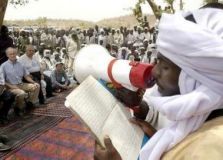Darfur refugees in Chad want UN peacekeepers, reject peace deal
June 10, 2006 (DJABAL REFUGEE CAMP, Chad) — Sudanese refugees flocked to meet United Nations Security Council delegates, imploring them to send UN peacekeepers to Sudan’s Darfur, rejecting the AU brokered peace deal.
 “Rapes, pillaging and murders are continuing outside the (refugee) camps under the eyes of the African Union,” an ethnic leader called Abubakar told the 15 visiting diplomats from the Security Council.
“Rapes, pillaging and murders are continuing outside the (refugee) camps under the eyes of the African Union,” an ethnic leader called Abubakar told the 15 visiting diplomats from the Security Council.
The Khartoum government has resisted a UN bid to take over from an African Union force in the region.
“We want an international force to intervene and the criminals to be judged,” he said as crowds of people held banners demanding a UN force in Sudan’s war-torn Darfur region and rejecting a recent AU-brokered peace deal.
The refugees have fled across Sudan’s western border to Chad from Darfur, where civil war and a humanitarian crisis have left up to 300,000 people dead and 2.4 million people displaced since February 2003.
The UN plans to deploy a peacekeeping force in Darfur to relieve the cash-strapped and poorly equipped AU troops, following the signing of a peace agreement between the Sudanese government and the region’s main rebel group.
But Sudan remains opposed to a UN deployment in Darfur. A foreign ministry spokesman on Saturday told reporters in Khartoum that priority ought to be given instead to reinforcing the AU’s capabilities.
His comments followed talks between a joint UN and AU team and Sudanese Foreign Minister Lam Akol on a possible UN peacekeeping role in Darfur.
In this camp in eastern Chad, 75 kilometres (47 miles) from the Sudanese border, refugees issued a clear call for UN help and rejecting the AU-brokered peace agreement.
“We want peace but the document that was signed does not represent peace,” said Abubakar, a leader of the Massalit ethnic group to which most of the 15,000 Darfur refugees in this camp belong.
The Security Council delegates also visited the nearby Gouroukoun refugee camp. It houses some 12,000 Chadians who fled their borderland villages to escape raids by the brutal Janjaweed militias loyal to Sudan’s government.
The UN estimates there are 235,000 Darfur refugees in Chad.
The refugee crisis has damaged relations between the two countries, already on a tense footing after Chad’s president Idriss Deby Itno accused Sudan of backing rebels who staged an unsuccessful coup against him in April.
Meeting the Security Council delegates on Friday, Chad’s Foreign Minister Ahmat Allami said Sudan was mounting a war to “destabilise” his country.
The Security Council visit to Khartoum meanwhile aimed “to explore ways and means for implementation of the Darfur peace agreement (DPA) and the role that can be played by the UN,” Sudan’s Foreign Minister Lam Akol told reporters on Saturday.
The UN plans to deploy a robust peacekeeping force in Darfur by the end of the year or the beginning of 2007 to take over from overstretched AU troops monitoring a shaky truce in the region the size of France.
Jean-Marie Guehenno, UN undersecretary general for peacekeeping operations, said a joint UN-AU team was exploring ways to strengthen the “AU forces in Darfur in the coming stage and finding mechanisms for a possible transition of the AU mandate to the UN.”
Sudan foreign ministry spokesman Jamal Mohamed Ibrahim said the government wanted instead to strengthen the AU force, but left the door open for a possible UN role.
“There may be some sort of UN participation complementing the AU role in Darfur,” he said, but added that “any UN role in Darfur should be in concert with the DPA which has not provided for any such role by the UN.”
The UN-AU team was due to split into two groups — a political one that will remain in Khartoum until Tuesday for talks with government officials and a technical one that departs Sunday on a tour of Darfur.
A major faction of the main Darfur rebel group, the Sudan Liberation Movement (SLM), signed the peace agreement with Khartoum on May 5, but the deal was rejected by a smaller SLM faction and another major rebel group, the Justice and Equality Movement.
(ST)
